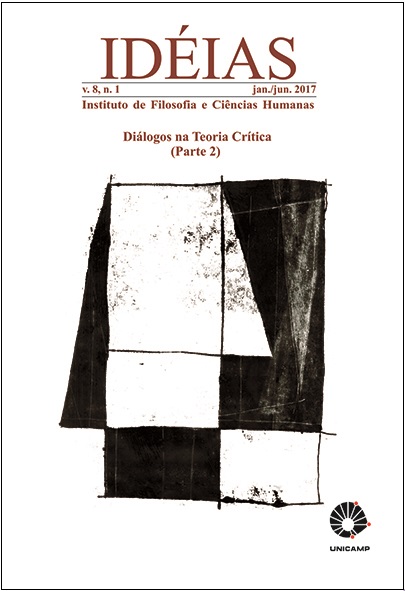Resumo
This article brings Erich Fromm and Theodor W. Adorno back into dialogue by discussing the cultural phenomena of humor and laughter based on their theoretical writings. I argue that what is typically considered socially critical humor, like offensive jokes or harsh satire, often fails to meet the preconditions of criticism in the light of Adorno’s and Fromm’s thinking. Humor, to be socially critical, has to be life-affirmative and non-positional, and it has to challenge the limits of humor. It is also claimed that in this scope, humor cannot be instrumental.
Referências
ADORNO, T. Minima Moralia. Trans. D. Redmond. 1951. Retrieved from: https://www.marxists.org/reference/archive/adorno/1951/mm/index.htm. Date of access: 11/08/2016.
ADORNO, T. Negative Dialectics. Trans. E. Ashton. London: Routledge & Kegan Paul, 1966/1973.
ADORNO, T. Aesthetic Theory. Trans. R. Hullot-Kentor. London: Continuum, 1970/2002.
ADORNO, T. The Culture Industry: Selected Essays on Mass Culture. Edited by J. M. Bernstein. London/New York: Routledge Classics, 1991/2002.
APTE, M. Humor and Laughter: An Anthropological Approach. Ithaca: Cornell University Press, 1985.
BAKER, B. The Power of a Smile – How Smiling Can Change Your Life and Change the World. 2012. Retrieved from: http://www.startofhappiness.com/the-power-of-a-smile/. Date of access: 14/08/2016.
BENTON, G. The Origins of the Political Joke. In: POWELL, C.; PATON, G. (eds.). Humour in Society: Resistance and Control. Basingstoke: MacMillan, 1988, p. 33-55.
BERGSON, H. Laughter. An essay on the Meaning of the Comic. Trans. C. Brereton and F. Rothwell. New York: The Macmillan Company, 1913/1899.
BILLIG, M. Laughter and Ridicule: Towards a Social Critique of Humor. London: SAGE Publications, 2005.
CRITCHLEY, S. On Humour. London: Routledge, 2002.
DAVIES, C. Jokes and Targets. Bloomington & Indianapolis: Indiana University Press, 2011.
FERGUSON, M.; FORD, T. Disparagement Humor: A Theoretical and Empirical Review of Psychoanalytic, Superiority, and Social Identity Theories. HUMOR, v. 21, n. 3, p. 283-312, 2008.
FEUER, M. Stop Laughing: Max Horkheimer and Theodor Adorno on Laughter, False Happiness, and the Culture Industry. 2015. Retrieved from: https://schlemielintheory.com/2015/01/18/stop-laughing-max-horkheimer-and-theodor-adorno-on-laughter-false-happiness-and-the-culture-industry/. Date of access: 19/07/2016.
FRIEDMAN, L. The Lives of Erich Fromm: Love’s Prophet. New York: Columbia University Press, 2013.
FROMM, E. Escape from Freedom. New York: Open Road/Integrated Media, 1941/2013.
FROMM, E. Man for Himself: An inquiry into the Psychology of Ethics. London/New York: Routledge Classics, 1947/2003.
FROMM, E. The Sane Society. New York: Henry Holt and Company, 1955/1990.
FROMM, E. Beyond the Chains of Illusion: My Encounter with Marx and Freud. New York: Continuum, 1962/2006.
FROMM, E. To Have or To Be? New York: Open Road/Integrated Media, 1976/2013.
FROMM, E. Greatness and Limitations of Freud’s Thought. New York: Open Road/Integrated Media, 1979/2013.
FROMM, E. For the Love of Life. Trans. R. and R. KIMBER. New York: The Free Press, 1983/1986.
FROMM, E. The Pathology of Normalcy. New York: AMHF, 1991/2010.
GOEHR, L. Philosophical Exercises in Repetition: On Music, Humor, and Exile in Wittgenstein and Adorno. In: BERGER, K., NEWCOMB, A. (eds.).Music and Aesthetics of Modernity: Essays. Cambridge/London: Harvard University Press, 2005, p. 311-340.
GRAY, A., PARKINSON, B.; DUNBAR, R. Laughter’s Influence on the Intimacy of Self-Disclosure. Human Nature, v. 26, n. 1, p. 28-43, 2015.
HORKHEIMER, M.; ADORNO, T. Dialectic of Enlightenment: Philosophical Fragments. Trans. E. Jephcott. Stanford: Stanford University Press, 1947/2002.
HULATT, O. Normative Impulsivity: Adorno on Ethics and the Body. International Journal of Philosophical Studies, v. 22, n. 5, p. 676-695, 2014.
KUIPERS, G. The sociology of humor. In RASKIN, V. (ed.). The Primer of Humor Research. Berlin/New York: Mouton de Gruyter, 2008, p. 361-398.
LEWIS, P. Cracking Up: American Humor in a Time of Conflict. Chicago: University of Chicago Press, 2006.
MCLAUGHLIN, N. Origin Myths in the Social Sciences: Fromm, The Frankfurt School and the Emergence of Critical Theory. Canadian Journal of Sociology, v. 24, n. 1, p. 109-139, 1999.
MÜLLER-DOOHM, S. Adorno: A Biography. Trans. R. Livingstone. Cambridge: Polity Press, 2005.
ORING, E. Engaging Humor. Urbana and Chicago: University of Illinois Press, 2003.
PROVINE, R. Laughter: A Scientific Investigation. New York: Viking, 2000.
RUCH, W. Foreword and Overview. Sense of humor: A new look at an old concept. In: RUCH, W. (ed.). The Sense of Humor: Explorations of a Personality Characteristic. Berlin/New York, Mouton de Gruyter, 1998.
SEPPÄLÄ, E. 7 Research-Based Reasons to Laugh Every Chance You Get. 2015. Retrieved from: https://www.psychologytoday.com/blog/feeling-it/201503/7-research-based-reasons-laugh-every-chance-you-get. Date of access: 27/07/2016.
SHUSTER, M. Humor as an Optics: Bergson and the Ethics of Humor. Hypatia, v. 28, n. 3, p. 618-632, 2013.
SIMPSON, P. On the Discourse of Satire: Towards a Stylistic Model of Satirical Humour. Amsterdam: John Benjamins Publishing Company, 2003.
SMUTS, A. The Ethics of Humor: Can Your Sense of Humor Be Wrong? Ethical Theory and Moral Practice, v. 13, n. 3, p. 333-347, 2010.
A Idéias utiliza a licença do Creative Commons (CC), preservando assim, a integridade dos artigos em ambiente de acesso aberto.

